#titan aaravos
Explore tagged Tumblr posts
Text

Me begging for more Giant Aaravos content
#please#i am in need#do your thing fandom#tdp#the dragon prince#giant aaravos#aaravos#tdp aaravos#startouch elves#star titan#titan aaravos#tdp spoilers#g/t#giant tiny
36 notes
·
View notes
Text
The Titan

And The King

#the dragon prince#aaravos#ezran#i wonder if the fact that these two were the first two characters focused on a poster was on purpose#and there is an episode called the titan and the king means something#especially as ezran is a descendent of TOQ who had the nova blade
163 notes
·
View notes
Text

Since chapter 6 of my fic is officially up, and Ellie's true form has been revealed to anyone reading (and I trust that you are all reading), I can now share this fun little pic I drew up of the actual height diff between Aaravos and Ellie.
#the dragon prince#tdp#aaravos#original characters#fanart#tdp fanart#for anyone curious ellie is 5'4"#roughly average height for a woman#not short#aaravos is just too tall by obligation#titan form or not#i might add shading to this eventually#but ngl i do like it as flats#also yes this is the start of my shoeless aaravos propaganda
60 notes
·
View notes
Text
Yeah so the way that Aaravos is enormous in the arc 2 title sequences:

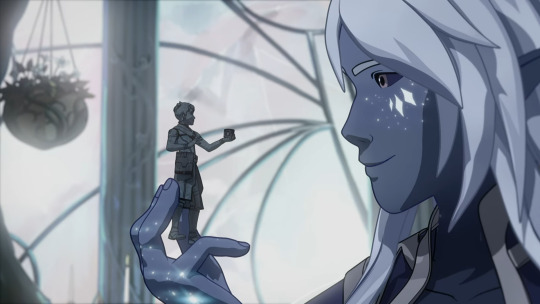
...and Claudia befriends and frees the imprisoned giant in Puzzle House, who reassures her that it doesn't want to eat her:

But we know that this giant is hangry:
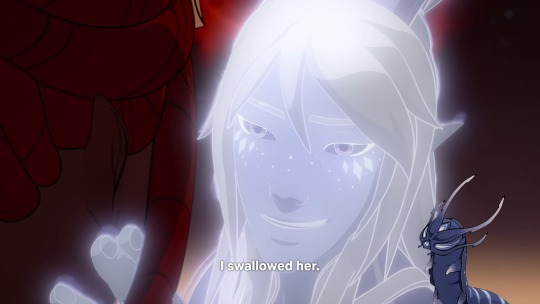
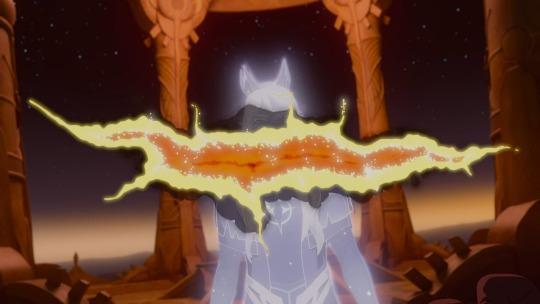
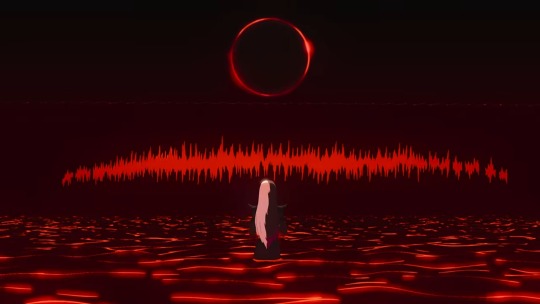
Claudia! The wave! It will swallow you up!
#aaravos with his titanic proportions. the magma titan. the titan prometheus. i hate it here#don't get me wrong. i'm still convinced it's gonna be callum who frees aaravos. howeverrr#“i swallowed her” intensifies#cannibalism motif#puzzle house#the dragon prince#so yeah. you can re-read puzzle house. but watch out#5x09#mine
197 notes
·
View notes
Text
I wish I could properly articulate why I believe Aaravos' manipulation didn't work on Ezran and turn it into a big meta but I really can't because I'm a sleep deprived idiot so I'll just keep it short....
EZRAN IS BEST BOY
#the dragon prince#tdp#tdp spoilers#tdp ezran#king ezran#the dragon prince spoilers#tdp aaravos#tdp s7 spoilers#tdp s7#tdp season 7#the titan and the king#ezran my king
48 notes
·
View notes
Text
Smooth Manipulators

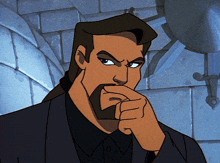



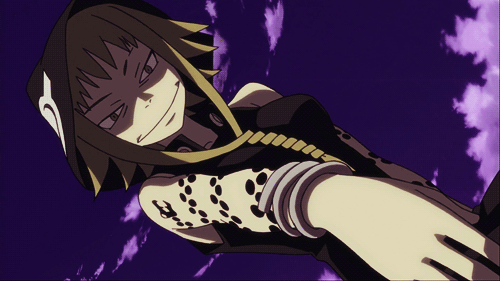
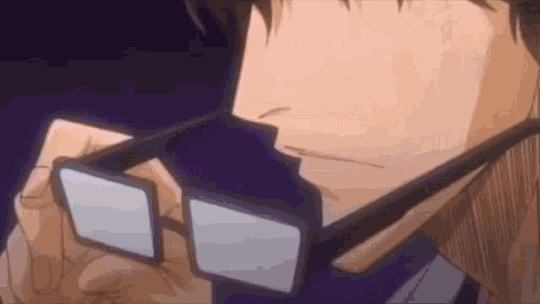
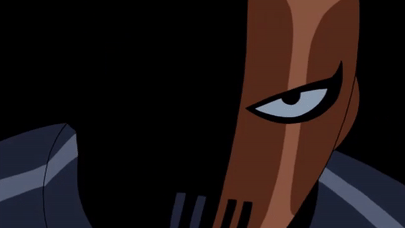
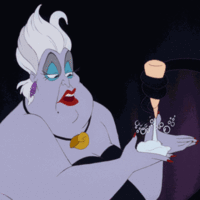
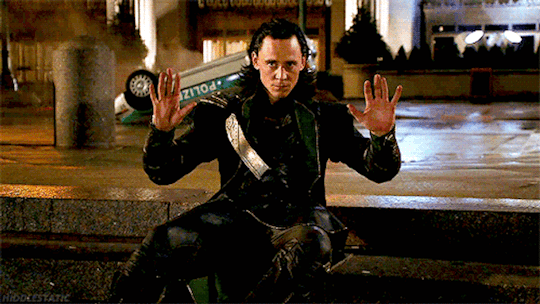
They always have these smug eyes that say "I've got everyone and everything playing out exactly as I wanted!" 😏
#aaravos#david xanatos#eris sinbad#princess azula#makima#medusa soul eater#sosuke aizen#slade teen titans#ursula#loki#smooth villains#manipulators#compilation#antagonists#villain
72 notes
·
View notes
Text


some aaravos sketches from a while back as I reminisce his lil bug pal era
#my little bug pal#oh how you've grown#like literally man's a titan now#aaravos#dragon prince#dragon prince season 7#tdp#tdp s7
38 notes
·
View notes
Text
Can't believe that The Dragon Prince is entering its AOT/SNK era 😭
Please let the odds be in our favor in this one...




#the dragon prince#the mystery of aaravos#tdp s6 spoilers#tdp aaravos#tdp viren#tdp spoilers#giveusthesaga#continuethesaga#attack on titan#shingeki no kyojin
30 notes
·
View notes
Text

I keep thinking about The Collector’s parallels with Aaravos and realized they also line up with Leola. So I think they’d be friends.

"His powers are chaotic and need reigning in, but Leola will burn him out."
#the dragon prince#tdp#the owl house#toh#toh the collector#tdp aaravos#tdp Leola#tricked behind mirrors#giant bones#all the Avizandum and Titan/Zym and King parallels#banished from heavens by short fused leaders#celestial motifs#phenomenal cosmic powers...
33 notes
·
View notes
Text
BLACK CAT: Crossover Question

X










#Black Cat (Manga Series)#Ben 10#Gargolyes (Disney)#Teenage Mutant Ninja Turtles#RWBY#Ultimate Spider-Man (Cartoon Series)#Teen Titans#Avatar: The Last Airbender#Transformers: Animated#Storm Hawks#The Dragon Prince: Mystery of Aaravos#Crossover#Question Poll
3 notes
·
View notes
Photo
#why wasn't this apparent in s7???#dude could've done all this in s7 but no!#why was he beaten so easily 😭#???#what happened to all that godlike power???#tdp s7#aaravos tdp <<< @salty-and-spiraling
Ugh so true!
Imagine Aaravos doing this to the archdragons. Just absolutely obliterate like child's play. I was so hyped for giant cosmic horror Aaravos 😭






Aaravos casting primal spells through Viren
#remember on attack on titan when eren finally mastered his titan powers#and straight up destroyed everyone#i wanted that so badly for tdp#give me a reason why everyone was terrified of aaravos#don't make me write a fic#tdp#the dragon prince#tdp s7#tdp aaravos
3K notes
·
View notes
Text
This post contains spoilers -
Apparently there is a scene where Ezran and Aaravos have a conversation (and Erik Todd Dellums delivers an insanely amazing performance) and I couldn't help but think, could this be the part where The Orphan Queen is discussed? Ezran is said to be just like TOQ so it would make a lot of sense if this is where Aaravos talks about how he was betrayed by the first of Ezran's royal lineage. Especially one Aaravos was close friends with (backed up by the soundtrack saying The Orphan Queen/An Old Friend).
Of course, this is all speculation and the conversation could indeed be about Leola but I think this would be the perfect opportunity for them to transition into a flashback with TOQ and Aaravos.
And from hearing Erik giving such a great and seemingly emotional performance, maybe a certain theory of using Leola to trap Aaravos really isn't so farfetched 👀
#the dragon prince#aaravos#ezran#leola#im really excited about this scene#even if its not a backstory scene and its just a scene of aaravos and ezran talking is gonna be hype#im guessing its in the titan and the king#sounds like its gonna be a very hype episode
20 notes
·
View notes
Text
I really liked how nuanced The Dragon Prince was as a show.
It starts with the Moonshadow assassins ready to kill King Harrow; you think that's sorta justified in your mind because Harrow killed Avizandum, the King of Dragons, so he kinda started it. Then you find out that Avizandum killed Queen Sarai, Harrow's wife, and Aanya's moms, so of course Harrow was furious at Avizandum and wanted revenge as well, it makes sense. Avizandum did it defending the borders and after they killed that titan, but you also know that they only crossed the border and killed the titan because it was either that or letting 100k people starve to death.
And it goes way back before that. They tell you that they kicked humans away of Xadia because of the use of Dark Magic (Dark Magic is horrifying). Then again, you see how some creatures like Sol Regem, the King of Dragons thought of humans: as lesser beings. Can you truly blame the humans for wishing to even the gap between them and the elves or dragons who saw them, again, as lesser beings? I can't, really. Do I think that Dark Magic is still horrifying, that it corrupts the mage and shouldn't be used? Yeah. Do I think that a few humans using Dark Magic justified Sol Regem wanting to basically commit genocide against the humans? Definitely not.
It's a cycle, a cycle of violence and hate where no one is fully right or wrong. That cycle didn't start with Harrow killing Avizandum, or with Avizandum killing Sarai. It didn't start with the humans being driven away from Xadia, or even with the humans starting to use Dark Magic. It didn't even start when Aaravos gave them Dark Magic either. No, he's to blame for many things and he continued the cycle, but he's not the one that started it, either. That cycle truly started when Sol Regem and the Startouch Elves decided to punish Leola simply because she gave Primal Magic to some of her human friends. They decided to kill a little girl because they said she broke their 'cosmic order'. That's when the cycle started, that's when the beginning of the end started, but not because she gave humans magic like they said. It was because they angered an inmensely powerful and vengeful father by cruelly killing his daughter in front of him. They started it, Aaravos continued it, and it's been like that eversince.
1K notes
·
View notes
Text
One Truth: The Nature of the True Heart
The Dragon Prince has long dealt with contrasts and tensions between idealism and pragmatism, particularly as a source for character conflict. From Harrow, Sarai, and Viren clashing over the Magma Titan to Callum, Ezran, and Rayla deciding whether to pursue killing Aaravos or securing his prison, principles weighed against practicality is a never-ending battle for the characters of this world and story.
Since the story never purports to give us the answers to the moral questions it poses, we as the audience are left to form our own opinions and judgements. One of those that is fairly consistent across a lot of the fandom is that Ezran is naive in his pacifism and reliance on negotiation. My opinion on this has largely always been "yeah, he's naive... but he's literally twelve years old and that's developmentally appropriate, even without the trauma."
We knew Ezran and his growth would be challenged in s7, but what we also got was a codification of that process as a tangible in-setting phenomenon: the true heart.
The true heart is described to Terry, Claudia, and us (the audience) as a way of seeing the world that is innocent and good-natured, without the complexities introduced by adult concerns. All children begin life with this worldview, but it is inevitably challenged over the course of their growth by situations that it cannot necessarily react to without being inherently altered.

It is possible, though rare, to hold on to the true heart past childhood into at least the beginning of adulthood—it is revealed to us that Terry is one who has, against all odds, retained his true heart. This allows him to read the map to the Garden of Innocents, the final resting place of unicorns. However, it's Ezran whose arc through s7 is most related to the true heart, as he confronts new challenges in the world around him as well as changes to himself and those he loves.
But what is a true heart? What does it actually mean to have one?
Simple and Clean: Language Surrounding the True Heart
First of all, I think the way the true heart is intended winds up being difficult to articulate properly because even the most neutral language used to describe it is loaded with baggage. Innocence, purity (though "pure" is a word used only by Kruha, who demonstrably struggles with human language), light and darkness, simplicity, and even childhood are all concepts that carry cultural connotations that skew our perception of what's being discussed.
In the heavily Christian-influenced culture of the West and USAmerica, the concepts of childhood, innocence, and simplicity in combination carry associations that become protectiveness, condescension, or dismissal. While childhood and innocence are valued as things that should be protected in those who have them, that leads adults to dismiss children as essentially lesser beings. Innocence and simplicity together are indistinguishable from naivete, another feature associated with a need for protection, but with a nice slice of contempt on the side. If you weren't so naive, you would have known better than to get hurt.
Finally, from a perspective saturated with Christianity, innocence is also conceptually inextricable from the concept of sin. Like, one of the central myths of Christianity is that the first humans were enticed to defy God and eat the forbidden fruit that granted knowledge of good and evil, which made them aware that their naughty sex parts and female-presenting nipples must be covered, which meant they had to be expelled from paradise into a world of struggle, pain, and death. This transgression was so severe that it tainted every human ever born, until a few thousand years later when God personally came to earth as a self-cannibalizing sacrifice to essentially pay bail on letting their souls into heaven. (This is a very serious and 100% theologically accurate summary, don't @ me.) As a result, we get fucking weird about innocence and its "loss."
The point is that in the setting, it's strongly suggested that there is no inherent "better" or "worse" to whether you have a true heart or not. You aren't morally superior for having one (though the nature of the true heart aligns more with compassion and openness, it doesn't have a monopoly on them), nor are you necessarily wiser or more mature for not. There are roles and circumstances where one might serve better than another—the likelihood of Ezran being able to continue indefinitely as king with a true heart has always been low, but an argument could definitely be made that his true heart was necessary to change the world, and the setting would not be what it now is without it. The true heart—as well as people who retain it into adulthood, like Terry—is a vital part of society, in that it inspires people toward an ideal. Terry calling out Claudia on her cruelty toward Rayla shames her enough to go back and correct it. Ezran giving up the crown in exchange for the safety of any moral dissenters within the Katolis army gives those dissenters space to take a stand—something crucial to their eventual victory.
So here's how I propose thinking about it in a way that's slightly less loaded with unnecessary associations: instead of innocence, the true heart is about faith. Specifically, an unwavering faith that people are inherently good. From that faith, several important conclusions are derived:
People are inherently good, therefore all people want the same or similar things both for themselves and for the world: peace, plenty, and community
People are inherently good, therefore if someone is intentionally doing things that hurt others, they either don't understand the impact of their actions or are lashing out as a result of fear or pain
People are inherently good, therefore treating everyone with dignity, respect, and compassion is the natural state of any society
These form the basis of the worldview and resulting behavior of those with true hearts.
The Tides are True: Depth and Complexity
Despite all of that, Aaravos describes the true heart in a fairly neutral manner to Claudia:
All children have a true heart. But as we grow up, we are forced to make choices, sacrifices, compromises. And they change us forever. Childhood innocence gives way to something... complicated.
and later to Terry:
The true heart is a gift of childhood. For a few wonder-filled years, we each have innocent eyes to experience the world's beauty in a simple way. I have seen generations of humans and elves accept the darkness that lurks in all of us beside the light. There is no black or white, only shades of gray. We must all carry complexity. But please believe me that there is beauty in this burden. Your heart will be a little heavier. But now, there will be no more half-truths.
In both explanations, he refers to what replaces the true heart—what we grow into—as "complicated." We learn to accept that nothing, including ourselves, is purely one way or another, but at some gradient point in-between that will be different from everyone else's. The words he uses—"light" and "darkness," "black or white," "shades of gray"—all carry strong connotations of a scale of morality, and the understanding that nothing can be fully good or fully evil, but is instead inevitably... complicated.
However, I think this is meant to be a little deeper than just that surface-level association to tie in with the overall light/dark and complex morality themes of the show overall. These are things we've heard in another context: of all the primal sources Callum could have focused on or arcana he could have unlocked in arc 2, there's a reason what we got was Ocean.
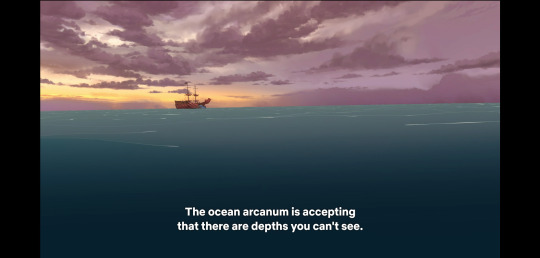


A better way to refer to the "darkness that lurks in all of us beside the light" is as those depths you can't see—it's not about good and evil, it's about clarity and obscurity. Simplicity and complexity. People, even people you love, aren't all the same. They don't all want the same things for themselves and the world.
There are depths within you that you may not see or understand, but even more so, there are depths in others that you will never see or understand. Even if someone is only lashing out because they're hurting, there are hurts you cannot heal. There are people who will refuse to allow their hurts to heal. There are people (and by people I mean Aaravos) who would rather make the entire world hurt along with them than ever allow themselves to heal. You can't heal these people for them. It's beyond your control, and all you can do is respond appropriately to their actions and mitigate the harm they do.
When you accept that, you will treat those people differently. You may decide to keep trying, but with the knowledge that it will be an uphill battle of strategy, compromise, and progress so slow that few will recognize your work as worthwhile. You may decide not to waste your time and effort on them anymore, and focus your attention on doing a broader range of good more efficiently than struggling to change a single heart or mind. You might decide to make them the enemy, and purposefully antagonize them because you are hurting, too—maybe even because of them.
The point is that there is now "us/me" and "them," and that's what's antithetical to the true heart. You can't fix everything simply by reaching the part of them that's the same as you. You will have to compromise.
A Just King: Ezran's True Heart
Before examining Ezran's true heart arc in s4-s7, I want to point out a much earlier, and perhaps unexpected, appearance of a textbook child's true heart:





Yes, back in s1e2, Callum had a true heart. (By the standards with which I'm describing it, at least.) Where did it go? When did it go? Someone more interested in Callum could probably write a very long essay about that. You could probably make a case that being possessed by Aaravos the first time is the final vestiges sliding away.
This also highlights my personal theory that the true heart of childhood is not usually lost in a single, all-or-nothing event. It's like losing your baby teeth—under normal circumstances, it happens one or two at a time over the course of a few years, until you've Ship of Theseus-ed your whole mouth. (Also, in contrast to things like "losing" your virginity, there's no weird purity or moral connotations to it. It is a completely normal thing that happens to everyone as part of growing up.) However, it's also possible to have some, a majority, or even all of your baby teeth traumatically knocked out of your head at once.

Oh, wait.
Let's roll back a bit, first. Ezran's arc, like... well, everyone's, gets its initial setup in s4. In fact, it kicks off s4: the major event starting the season is Zubeia's visit to Katolis, which is clearly one of Ezran's first big initiatives toward not just peace, but potential unification.
In the lead-up to Zubeia's visit, Ezran's true heart is on full display in his behavior and the assumptions he's making:


Zubeia is a good person, and good people will understand and accept that both she and other dragons should be treated as friends.
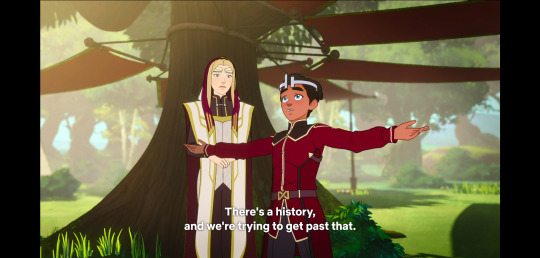
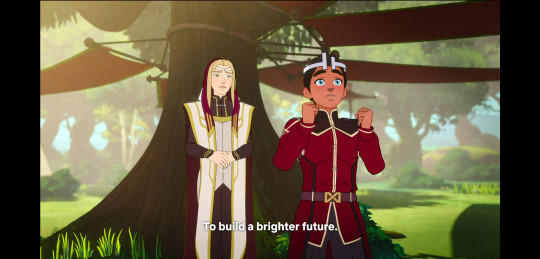
Everyone will approach this meeting with open hearts, because everyone wants to grow toward peace and understanding.
Even when the meeting, where he is honoring the Dragon Queen in the final resting place of human kings and queens, no small number of whom (including his own mother) were killed by dragons, is sabotaged by a relatively mild act of vandalism, look at his response:
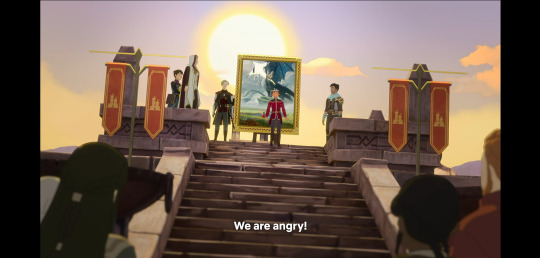
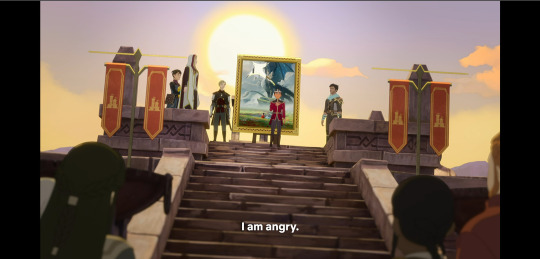
The person who did this is obviously lashing out because they are hurting—they are angry, and that anger needs to be soothed. He affirms that he and the people are the same, inside. They are all angry and in pain... but, like him, they all want to not be angry and in pain anymore, and understand that the way to do that is to move forward.
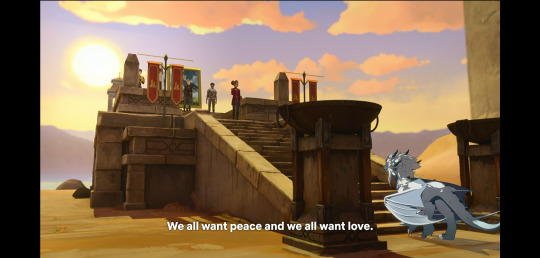
This is not to say that he's wrong, or even ineffective—he speaks from his true heart, in a poignant call to both himself and his people to acknowledge the past while looking to the future, and to reach for that future in every way they can instead of clinging to the hate of the past. It's a key scene for all of arc 2, and one that is returned to over and over again, thematically.
However, it's also a point where he demonstrates how his true heart leaves him ill-equipped to approach Rex Igneous's selfishness, or Sol Regem's hatred, or even Karim's petty arrogance... much less the shit Aaravos has going on.
(Speaking of Sol Regem... he not only refuses to be healed, but instead demands to be remade into an engine of indiscriminate death and destruction. He really does out-bitter Aaravos, on occasion.)
Then s7 hits, and two things happen: Katolis is destroyed, and Runaan is returned to the living world. Well, both of those technically happen in s6, but Ezran actually has to deal with them in s7.
For all that Katolis being destroyed sets Ezran on a path toward the complex politics and morality of nuclear deterrence, it's really the situation with Runaan that both tests and exemplifies Ezran's true heart. Aaravos's initial explanation of the true heart ("Childhood innocence gives way to something… complicated.") is directly overlaid on Ezran's dealing with the aftermath of Callum helping Rayla and Runaan escape the Banther Lodge. I don't think Ezran ever really expected to have to deal with Harrow's killer, since Runaan is presumed dead, so he's unprepared to be confronted with it—particularly given that he has convinced himself he's over it, when he really isn't. He's tested both in suddenly facing a person he can't see as good, deep down. Runaan wasn't lashing out because he was hurting or scared, nor can Ezran conceive of them wanting the same things. There's also the sense of betrayal at Callum and Rayla differing so deeply from his own reaction, when they were previously so in tune—literally banding together despite being born on opposite sides of a millennia-old war, because they recognized the goodness in each other and that they all wanted peace.
Ezran's reaction to Runaan is definitely affected by what happens to Katolis—he's denied not only any kind of justice for Sol Regem's attack, but any explanation. Runaan's fate is something he can ostensibly control, in a situation where he feels both responsible and powerless. Now, an entire separate post could be done about s7's recurring exploration of punitive versus restorative justice through Rayla's trial, Ezran and Runaan, Janai and Karim, Terry, and (as always) Aaravos, but to briefly recap part of my meta on Terry's true heart and growth: Terry, in being challenged during s7, comes to realize that even if he chooses to continue holding to his true heart's faith in the world and others, he is complicit in the harm Claudia and Aaravos have done, and he feels compelled to start doing the work to repair that harm as much as he can. While he hasn't necessarily done anything that would warrant punitive justice, he recognizes that truly doing good requires work and effort, and sometimes doing difficult things. There's not really anything Runaan can (knowingly) offer to make right what he did, beyond his confession that he has come to realize everything he believed at the time was wrong, and he did grievous harm to Ezran that night. However, in that confession, he says something crucial:






Ezran's true heart led him to rule in a way that changed the world for the better, moving toward an unprecedented era of peace—something that, to Runaan's eyes, required a great deal of strength to put aside completely legitimate pain and grievances that could have easily rekindled millennia of war. (See also: "It's a strong name" in that Terry meta.)
I think it's in part because of that reminder—the description of the kind of person and king he wants to be—that Ezran chooses compassion and working toward forgiveness with Runaan. He's not choosing the true heart as a core part of his identity the way Terry does, but his own past true heart inspires his current self to make a decision that's right, but also hard. As with Terry, he is discovering that goodness can take work—true, concerted effort to both determine and follow the right path.


Does Ezran retain his true heart throughout s7? I don't know. I don't think it's entirely as simple as a yes/no state, and he has definitely lost some of his earlier confidence and beliefs. Ultimately I'm not sure it matters. He took a solid punch to the mouth, but either way... it seems like he's going to come out of it okay.
Not Worthy: Claudia's Skewed Perception
And now, a final tangent.
All that stuff I said earlier about a true heart not making you better or worse, and its "loss" being morally neutral? Well, there's at least one person who doesn't see it that way.
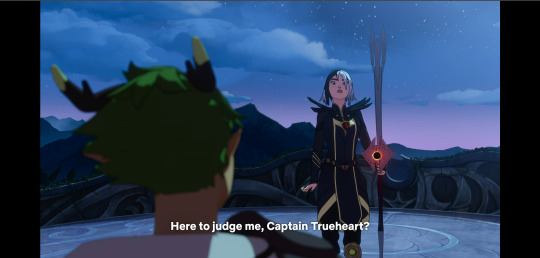
In s7, Claudia's inability to read the map and Terry leaving her (as she knew he would, when he learned the truth about her and her behavior) both contribute to the insecurities she has carried for most of her life. Claudia derives most of her self-worth from being very good at dark magic, and therefore loses emotional stability when either she "fails" at something magic-related or dark magic itself is questioned.

This is an interesting connection, because the true heart and/or its loss isn't inherently linked to dark magic. A true heart doesn't shrivel and die at your first dark magic spell, but it's inevitable that the practice of dark magic will at some point become impossible to reconcile with the core beliefs of the true heart simply because they're inherently incompatible... you can't see sapient magical creatures as "people" the same as you and as resources for spell ingredients. So while it's not surprising that Claudia no longer has her childhood true heart, it's not necessarily because of her dark magic... and yet, some part of her perceives it as an indictment against her.
We also know exactly where she probably internalized that view:
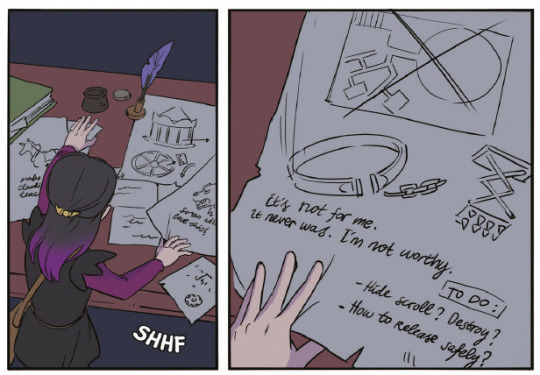
Puzzle House is actually where we first encounter the concept of the true heart, as a yes/no state that allows you to access the map to the Garden of Innocents. Kruha, the map's guardian, doesn't ascribe any moral value to being able to see the map or not—noting that he, himself, is "too old" to see it, anymore. However, a single note from Kpp'Ar, combined with her own insecurities at a point of emotional turmoil in her life—her mother has left her, Kpp'Ar has (apparently) left her, she's acting out by attempting increasingly complex self-taught magic and keeps getting in trouble because of it—lead even a 7-year-old Claudia to question whether she might also be unable to see it due to being "not good."
We still don't know why Kpp'Ar was seeking the Garden of Innocents and what caused his "change of heart," but if it's at all comparable to Viren's experience, he was going through The Horrors(tm)—it's not surprising that he'd indulge in a little self-loathing in what's meant to be a private note. Claudia, meanwhile, has her faith in him as a mentor figure she wishes to emulate shaken—he imprisoned Kruha, keeping him collared like an animal, away from his home and family. She knows that's wrong, and struggles to reconcile the Kpp'Ar she knew with someone who would do that. If Kpp'Ar is somehow bad, and she didn't know, could she also be bad and not realize it?
This is particularly interesting to me because she doesn't have this crisis when Viren quits dark magic, even when he explicitly tells her he led her down the wrong path. She does question whether she should also quit dark magic, but it's from the perspective of "it seems like it might have done him a lot of good, emotionally... maybe I should also try it?" rather than "my dad thinks I'm evil, actually," or even "my dad explicitly said he hopes I'll take a different path, one day... am I betraying him if I don't?" She's remarkably chill about it, though to be fair, she's probably still in a state of emotional shock and dissociation. She gets progressively more sensitive about it again during s7, particularly as she receives validation from Aaravos.
Anyway, just a little window into which little wheels are spinning in Claudia's head when she insists she hasn't changed:


I'm sure that won't be significant as she starts her Dragon Girl Summer (and Autumn, and Winter, and Spring).
#the dragon prince#tdp spoilers#s7 spoilers#the dragon prince spoilers#ezran#also a little bit of#claudia#screams into the abyss OKAY I'M DONE#literally like four other versions of this started in my drafts#not counting the one that became the terry meta
58 notes
·
View notes
Text













“Your fatal flaw may destroy us as well as yourself." “That’s not a flaw. Just because I want to help my friends—" “The most dangerous flaws are those which are good in moderation.”
—Percy Jackson and the Olympians, The Titan's Curse (modified with Aaravos' name instead of Kronos')
#callumedit#snake boi callum#decided to treat myself with a s6 remake. and then i'll get to do a s7 remake#with percy's back up 'i knew annabeth would never forgive me if i saved her instead of the quest'#bc mm yeah consistency#tdpedit#tdp#the dragon prince#tdp callum#callum#remake#quotes#pjo#my edits#graphics#my previous one also wasn't very CHET-y so i decided to be indulgent here too
117 notes
·
View notes
Text
The Dragon Prince - breaking the cycle of violence with The Cycle of Hope
Tiadrin and Lain convince Viren to keep the egg alive
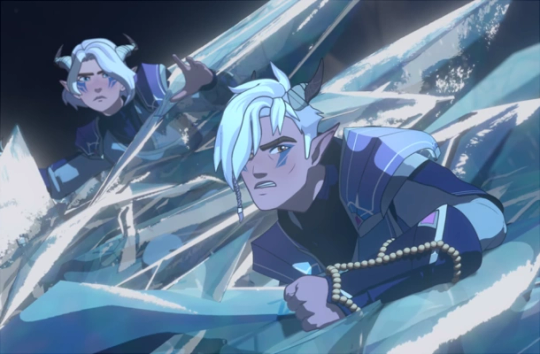
Harrows Letter
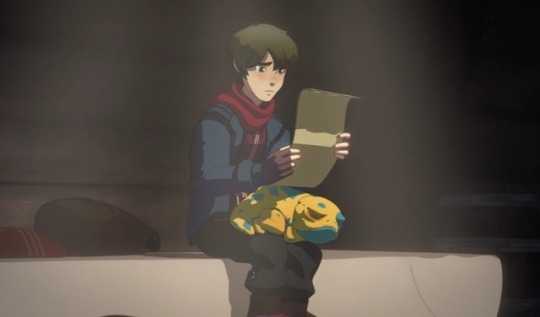

The first moment the cycle of violence is brought up

Ezran, Callum & Rayla finding the egg

Callum using Primal Magic on his own

Zym breaking Raylas binding

Ezran breaking the chains of history
Org Post - Harrow marches towards the Katolis towers, where his war and throne rooms await him in S1. Come S3 Ezran does the opposite. Despite being in literal, physical chains at the end of his reign, Ezran broke the metaphorical chains of history when he chose to make peace with Xadia. And just in case that wasn’t enough of a gut punch, Frederick Weidmann (the show’s composer) uses the same score (Last Sunset) in both scenes to nail home the connection

Callum breaking Ethari's moon opal = breaking away Rayla from the past

Amaya and Janai saving each other



Soren Leaving his Father

The Final Battle - elves and humans fighting alongside each other


Humans and Elves coming together saved Zym

Looking back S4 and S5 really should have been one season, cause both are really introductory seasons for Arc 2 and setting things up to some very beautiful moments:
Soren offering up his heart - this act of selflessness is what inspires the next cycle breaking moment

Viren unknowingly standing up to Aaravos both physically and metaphorically

In the Magma Titan backstory Harrow refuses to listen to Sarai, Sarai kills the Magma Titan, Avizandum kills her, and then Harrow kills Avizandum
S6E5 The Moonless night breaks that cycle..... Callum instead choosing to listen and trust Rayla, leads Rayla to piercing Esmery's heart with kindness, thus allows them to get 2 quasar diamonds

Rayla telling her parents what happened so the could pass peacefully

Callum bringing back Runaan, undoing dark magic

And now Season 7.... its time to bring full circle moments around, to show how the Cycle of Violence truly is breaking
One of the most major moments is Rayla being forgiven by the Silvergrove..... which if you didn't notice, is a DIRECT parallel moment to the Council of Startouch Elves not forgiving Leola

Raylas parents saving the egg allows the trio to save Zym and bring him back him, which then in S7 allows Avizandum to break free of having Unfinished Business, thus saving Callum from dying, the step son of the man who killed him, and who is still needed to break the cycle of violence

The dragons dying to save BOTH humans and elves

Ezran forgiving Runaan....... which allows everyone to put the pieces together and realize Harrow is alive


And of course Evyrkynd
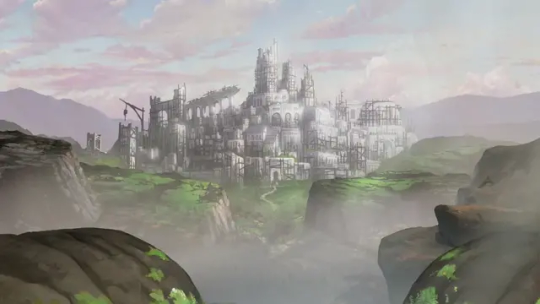
#tdp#the dragon prince#callum#ezran#rayla#avizandum#zym#harrow#tiadrin#lain#soren#viren#claudia#cycle of violence
37 notes
·
View notes